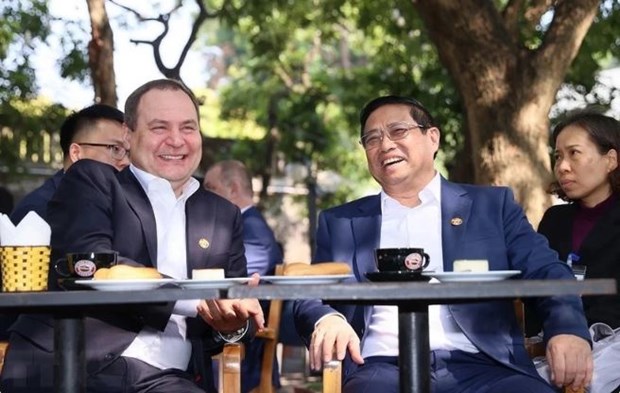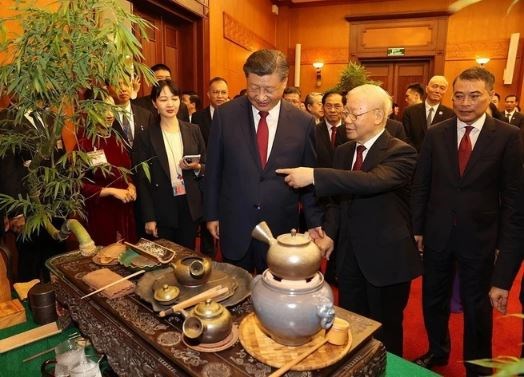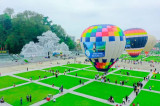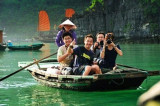Vietnam to promote tourism through national diplomatic activities
Vietnam is leveraging its diplomatic activities to enhance its tourism image, which has garnered positive evaluations from experts in recent times.

Prime Minister Pham Minh Chinh and his Belarusian counterpart Roman Golovchenko enjoy coffee at the ancient Hanoi flagpole tourist site. (Photo: Duong Giang/VNA)
Pham Ha, Chairman of the Lux Group, highlights the significance of tourism promotion activities, alongside the development of tourism products, quality of human resources, and policy institutions, as crucial factors in advancing the tourism industry.
However, according to Ha, Vietnam has yet to be successful in building its national tourism brand, resulting in the ineffective promotion of Vietnamese culture, history, nature, cuisine, and people.
Additionally, the country has not made optimal use of tourism funds and has missed out on participating in major events such as the Internationale Tourismus-Börse Berlin - the world’s largest tourism trade fair, and the World Travel Market London - the most influential travel and tourism event globally.
Vu Quoc Tri, General Secretary of the Vietnam Tourism Association, emphasized the importance of international tourists to contributing to the GDP as they are particularly drawn to Vietnam’s natural destinations.

International tourists like to explore the nature in Vietnam (Illustration photo: Collaborator/Vietnam+)
Considering the challenges posed by the global economy, Vietnam needs to capitalize on national diplomatic activities to attract foreign visitors.
The year 2023 witnessed a series of successful diplomatic exchanges. These include the signing of bilateral comprehensive cooperation agreements with heads of major countries and the commemoration of the 50th anniversary of diplomatic relations with a series of countries in the past year.
These events have significantly bolstered the global promotion of Vietnam’s image and its people.
Nguyen Cong Hoan, Deputy General Director of Flamingo Holding Group and CEO of Flamingo Redtours, reveals that the visits of heads of state and the subsequent diplomatic activities have contributed to the surge of visitors to Vietnam.

General Secretary Nguyen Phu Trong invites General Secretary and President of China Xi Jinping to attend a tea party and enjoy three types of premium Vietnamese tea. (Photo: Tri Dung/VNA)
Nevertheless, according to Hoan, while such diplomatic endeavors are essential, they are not, on their own, sufficient.
Vietnam should take various measures, including tourism product development, advertising campaigns, simplifying visa entry procedures, and improving the connection between tourism and aviation to cater to the needs of more than 20 million holidaymakers.
Sharing the same view with Hoan, Vu Quoc Tri suggests actively engaging with foreign markets and promoting Vietnam’s tourism offerings rather than relying solely on opportunities in the domestic market.
In a nutshell, Vietnam’s leveraging of national diplomatic activities has proven effective in bolstering its tourism image. However, it is crucial for the country to undertake comprehensive efforts in product development, market promotion, and service quality to maximize the potential of its tourism industry.
Vietnam welcomed nearly 12.6 million international tourists in 2023, more than three-fold rise from the previous year, surpassing the target of 8 million set earlier, according to the General Statistics Office.
With nine UNESCO-recognized heritage sites, including five cultural, three natural, and one complex heritage, Vietnam won the World’s Leading Heritage Destination 2023 title of the World Travel Awards for the fourth time. Thus it is clear that diplomatic exposure is certain to add a sophisticated layer to tourism promotion in a country replete with globally-recognized tourist attractions./.

Prime Minister Pham Minh Chinh invites Belarusian Prime Minister Roman Golovchenko to the Vietnam Military Museum before enjoying coffee and admiring the Hanoi flagpole. (Photo: Duong Giang/VNA)
VNA
 Agoda lists Da Lat among cheapest destinations for year-end holidays
Agoda lists Da Lat among cheapest destinations for year-end holidays
 TasteAtlas picks out two Vietnamese dishes among world’s 100 best rated crustacean dishes
TasteAtlas picks out two Vietnamese dishes among world’s 100 best rated crustacean dishes
 Vietravel expands business in Indian market
Vietravel expands business in Indian market
 2025 Nha Trang – Khanh Hoa Sea Festival to spotlight cultural heritage space
2025 Nha Trang – Khanh Hoa Sea Festival to spotlight cultural heritage space
Vietnam, a unique destination attracting Indian tourists: Indian newspaper
 Cao Bang eyes new opportunities for cross-border tourism development
Cao Bang eyes new opportunities for cross-border tourism development
 Kien Giang strives to attract tourists to finish the year on high note
Kien Giang strives to attract tourists to finish the year on high note
 Rivers provide major resources to boost Vietnam’s tourism
Rivers provide major resources to boost Vietnam’s tourism
 Dong Thap plants over 100 ha of flowers for Tet
Dong Thap plants over 100 ha of flowers for Tet
 Donghai Airlines launches direct route to Khanh Hoa
Donghai Airlines launches direct route to Khanh Hoa



